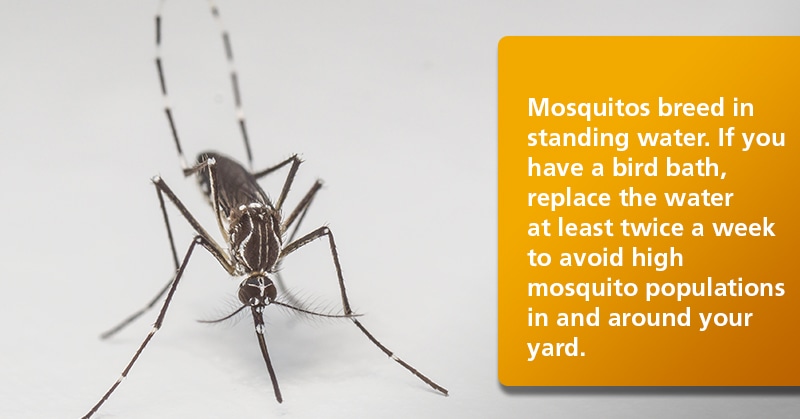Taking the sting out of summer pests

Summer has arrived! After a long Canadian winter, you want nothing more than to get out there and feel the sun on your skin. Keep in mind that you have to share your outdoor space with stinging and biting pests, some of which can carry serious diseases. Here are some things to keep in mind to prevent mosquitos, ticks, bees and wasps from taking the joy out of your sunny days.
Mosquitoes
It’s hard to believe these tiny insects can carry West Nile Virus, and sometimes other diseases depending on where they are in the world. While this alone may make you want to remain indoors for the summer, or while on vacation, there are ways you can avoid being bitten by mosquitoes.
- Get rid of all sources of standing water that could become breeding grounds for mosquitoes such as old tires, discarded pots, pool covers — anything that allows water to collect. If you have a birdbath, replace the water at least twice a week.
- Keep pool water and ornamental pond water circulating. In ponds, encourage the help of natural enemies of the mosquito. Fish, beetles, water bugs and dragonflies eat mosquito larvae so let them thrive.
- Store flowerpots, watering cans, wheelbarrows and wading pools upside down when not in use.
- Keep your outdoor garbage, recycling, composting bins and rain barrels covered.
- Clean out clogged eavestroughs.
- If possible, wear loose-fitting, light-coloured, tightly woven, long-sleeved shirts, pants and socks outside. Mosquitoes are attracted to dark-coloured fabrics.
- Mosquitoes are drawn to the scent of feet; so closed shoes are a better option than flip-flops.
- Keep mosquitoes out of your home with tight-fitting screens on windows and doors.
- Mosquitoes are most active between dusk and dawn, so try to stay indoors during that time.
- If you spot a dead bird on your property, it can be an indicator of West Nile Virus. Report it to the local authorities but don't handle the carcass.
Use a repellent with DEET on exposed skin and on thin clothing (mosquitoes can bite through thin fabric). DEET masks your scent preventing insects from locating you. A repellent containing 30% DEET can protect your skin from mosquitoes, ticks and flies for up to six hours. Be sure to check the label for proper application instructions. Some DEET products are not safe for children. Do a patch test for an allergic reaction and do not use on sunburned skin or open wounds.
If you prefer a natural insect repellent, combine these ingredients in a small spray bottle:
- ½ cup witch hazel
- ½ cup apple cider vinegar
- 40 drops essential oils (eucalyptus, lemongrass, mint, citronella, tea tree or rosemary)
Ticks
The trouble with ticks is that they can carry Lyme Disease. Lyme Disease is an infection that results in flu-like symptoms and in more serious cases, can lead to problems such as arthritis and neurological issues.
Ticks attach themselves to the skin of humans and pets where they begin to feed on the blood. Needless to say, you want to keep yourself and your pets free of these pests.
To avoid ticks, it’s important to know where they live. Ticks like dense, dark and dank wooded areas, and tall grassy areas. Ticks hang out on the edges of leaves and branches, waiting to hitch a ride on a passing host.
When walking in tick territory:
- Wear a hat, a shirt with long sleeves and long pants. Tuck your pants into your socks, and your shirt into your pants.
- Stay in the centre of a path or trail to avoid brushing up against vegetation.
- Walk in dry, sunny areas.
- After your walk, perform a full body check on yourself, your children and pets.
If you find a tick:
- To transmit Lyme disease, the tick has to be attached to the skin for at least 24 hours. That’s why it’s important to do a body check immediately after your walk, and to act quickly if you find a tick.
- Remove it with fine tweezers. Grasp the tick close to the skin and pull upward, being careful not to crush the tick. Disinfect the bite with rubbing alcohol.
- If it's been more than 48 hours since you've been bitten, see your doctor. You may be prescribed an antibiotic.
To keep ticks off your property, keep your lawn mowed, and remove debris and brush piles. If you have a woodpile, store your wood in a sunny place.
Insects with stingers
Being stung by a bee, wasp or hornet is very painful, and if you are allergic to stings, it can be life threatening. Remember that in most cases, these insects attack if they feel they are being threatened, so your best course of action is to try to avoid them. Here are some tips to living in peace with stinging insects.
Avoid these attractants:
- Perfumes or colognes smell like flowers to bees and wasps, and can attract them from a long way off.
- Brightly coloured clothing, especially floral prints, are an open invitation to bees (That’s why beekeepers wear white.)
- Wasps are attracted to white and yellow – but can’t see red.
- Sugary foods and drinks are irresistible to bees and wasps. If you’re drinking soda from a can, check inside first to make sure a bee or wasp didn’t sneak in when you weren’t looking. Or to be safe, pour your drink into a glass.
- Fresh fruits attract stinging insects. Check your fruit before eating it outside. And don’t leave peach pits or orange peels lying around.
- Empty pop cans and beer bottles, and food waste are attractants. Rinse your garbage and recycling cans and keep tight lids on them.
When walking outdoors:
-
Always wear shoes to avoid being stung. Bees like clover blossoms and other small flowers in the lawn, and yellow jackets and some wasps nest in the ground.
-
Wear tighter fitting pants and shirts with cuffs. Stinging insects may find their way up your pant leg or into your shirt. If you feel something inside your clothing, your first instinct will be to slap at it, which will almost certainly result in you getting stung.
If you encounter bees and wasps:
- Take a deep breath and stay still. If you swat at them, they will feel threatened. If you stay calm, they will most likely fly away.
- If you’re driving when you discover a bee or wasp has found its way in, don’t swat at it. Remain calm, pull over and roll your windows down to allow it to escape on its own.
If you kill a wasp – more will come.
- Wasps in distress or killed emit a pheromone that is essentially a call to a nearby colony. You may get more than you bargained for when trying to rid yourself of a single wasp. Try to let it leave the area on its own.
Don’t let these summer pests force you to stay indoors. If you use common sense and remain calm, chances are you can enjoy your summer days with nary a bite or sting.







